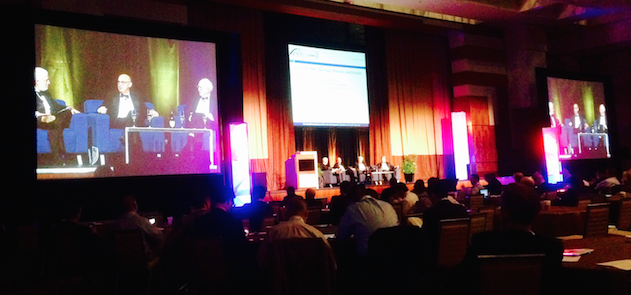The Overconfidence Bias
The year was 2008.
The CEO on stage was the epitome of confidence –– wearing his favorite custom-tailored suit, starched shirt with sparkling cufflinks, a full Windsor knot on the silk tie, and sporting a matching shiny leather belt with recently buffed Italian shoes. Flanked by an interactive slideshow projected on the oversized screen, he made crisp and declarative statements about his recent research into the market’s future.

The American Securitization Forum in Las Vegas in February 2008 (immortalized in Michael Lewis’ book and movie, The Big Short) was a celebration of the subprime mortgage market. 45 days later, Bear Stearns had failed due to its bets on subprime and the world’s banking system was collapsing.
The audience was enthralled by his Harvard-educated observations, and especially with the way he was able to distill such incredibly tedious and complex topics into simple and easily consumable strategies.
His conclusion? The market was roaring along, and the future looked bright.
Two months later, the entire economy was in total free-fall –– and he was unemployed.
Tick. Tick. Tick…
The above illustration is not imaginary –– the scene repeated itself hundreds of times throughout 2007 and 2008 –– and continued literally right up to the point where the economy collapsed!

Those who we presumed to know things –– the really important things –– literally knew nothing.
They did their research, looked at the numbers, deployed their considerable problem solving training, and completely missed the boat.
It is kind of frightening when you think about it.
Why did they miss so completely –– despite access to the best information and teams of analysts at their disposal? Perhaps they were a little too confident in their abilities.
Weaponizing Confidence
Watch any TedTalk, or attend any seminar, or turn on CNBC, or simply listen to any accomplished speaker, and you will be drawn to the confidence they exude.

A good speaker is fun to watch.
But when you stop and think, a really important question emerges –– are we falling for their polished ways and crafted persona or are we rigorously vetting their research methods and conclusions? For most of us, it is really difficult to separate style from the substance, especially when we don’t have a deep knowledge of the topic –– and we assume what we are hearing is, in fact, correct.
But here is where it really gets dangerous –– their confidence not only leads US to believe that they must be correct, but it also leads THEM to believe that they must be correct, too!
The confidence that captures us, also captures them.
And that is a massive problem.
Thinking Overconfidently
Look, I am not suggesting that all well-heeled public speakers with slick slide decks are incorrect.
I am simply suggesting that they are not always as correct as we presume them to be –– and they are definitely not as correct as they presume themselves to be.
And there is a reason for it.

Daniel Kahneman, Nobel Prize Winner in Economic Sciences and author of the groundbreaking ‘Thinking, Fast and Slow‘ tells us why.
He discovered that we, as human beings, use shortcuts in our thinking that consistently lead us to off-base (if not downright incorrect) conclusions.
The consistently off-base mistakes we make he labeled ‘Bias‘ (there are over 150 documented biases) and these mistakes occur because we utilize generalized ‘rules of thumb’ called ‘Heuristics‘ to guide our decisions.
Simply put, we rarely think, we pretty much just react.
In other words, far too often we react FAST, when we need to think SLOW.
And it leads us off base –– often times dangerously so.
The Overconfidence Bias
Do you want to know the worst part of our overuse of heuristics? We are blissfully unaware we do it.

Why? Because of one specific bias –– the Overconfidence Bias.
The Overconfidence Bias is as it sounds –– it is the tendency to be far more confident in our skills and knowledge than we should be.
Simple enough to spot, right? You see it in the people who strut around with their chin in the air, always having a reason or explanation for everything, and summarily dismissing anyone who dares to offer a rebuttal.
We tend to call overconfident behavior arrogance, or cockiness, or conceit (or worse) –– but we generally recognize the extreme forms of overconfidence when we see them.
I’m Not Overconfident –– I’m Correct
So now, close your eyes and imagine the people you know who epitomize overconfidence. How many faces come to mind? One? Five? Twenty?
I’ll bet there is a face you don’t see –– your own.

Wait, what?!? Did you just accuse me of being overconfident –– and not knowing it?!?!
Yes, I did.
When you think of overconfident people, you think of everyone BUT yourself because that is precisely what overconfidence does –– it makes us far more confident in our own beliefs and predictions than we should be.
And, just like everyone you imagined above, you (and me) are blind to our own tendency to act in the same way.
That is not a good thing.
Think About It
Overconfidence manifests itself in many ways –– but several specific behaviors stand out:
- We place too much confidence in our poorly researched decisions and make overly confident predictions because of it.
- We quickly dismiss new information that runs contrary to what we have already decided.
- We attribute our successes to our talents, and we blame bad luck or other’s incompetence when we fail.
- We assume that the more successful we are in our own field, the more successful we will be in other fields.
- And (worst of all) we are blind to our own overconfident behaviors!
Don’t believe me? Think about the following:
- Studies have shown that 90% of Americans consider themselves ‘better than average’ drivers –– which is (of course) statistically impossible.
- 40% of US marriages end in divorce, but no one thinks that stat applies to their marriage.
- 50% of small businesses fail within 5 years, but people keep opening businesses and placing life savings at risk.
- The stats are even worse if the business you open is a restaurant (80% failure in 5 years.)
- And (ironically) the attrition rate for real estate agents is even worse than restaurants (87% of the new agents leave the business within 5 years) –– let that one sink in for a second. You are likely reading this blog because of your own overconfidence bias.
Still believe that you aren’t subject to being overconfident?
The Danger is Real

So what happens when we are overconfident? Sometimes, we do damage.
With clients, we might:
- tell them that we could get a price for their home because we are the most skilled agent in the market –– and we can’t
- project a neglected neighborhood’s past condition as also its future condition –– and miss a potential opportunity for our client
- dismiss their legitimate concerns as uninformed or trivial simply because we are the ones with experience, not them
With ourselves, we might:
- believe that our expertise in real estate sales translates to success in building or development –– and get ourselves dangerously overextended
- believe that because we are good at selling, we are also good at management –– and either expand our team or open a brokerage
- assume that our success is the result of our skills when it might really be the low inventory levels and low mortgage rates –– and not put contingency plans in place for a market shift
Luckily, the damage we do to our clients is somewhat contained to housing –– and that is probably a good thing. When other professions (Doctors, trial attorneys, or politicians) act overconfidently, the damage can be a lot more severe and long-lasting.
Hopefully, becoming aware of the tendency means that when the overconfident version of ourselves shows up and starts making decisions, we recognize it quickly and adjust our behavior accordingly before any permanent damage is done.
Fight Back
The best way to fight overconfidence is easy –– be willing to learn. A learning mindset is by far and away the best defense.
When you accept we only know a fraction of what we need to know to make good decisions, the tendency to be overconfident decreases.

Stated differently, when you acknowledge that not only are there things you don’t know, but THERE ARE THINGS THAT YOU DON’T KNOW THAT YOU DON’T KNOW, then you immediately become a far better thinker and decision maker.
Assuming that you don’t have all the information you need to make a decision is exhausting, but walking around oblivious to your own flawed thinking is a ticking time bomb.
Conclusion
It is easy to mistake over-confidence for legitimate confidence as they present in largely the same way (consider the example of the speaker from above.) The line between the two is not only razor-thin, but extremely well disguised –– and the results are disastrous when the overconfidence bias is in control.

Am I saying that we should refuse to make any decisions until we consider all imaginable information and all possible outcomes? Of course not –– we would never get anything done.
But I am saying that we need to check ourselves when we start exhibiting the outward signs of the overconfidence bias –– taking too much credit for positive outcomes, blaming others for our own failures, blindly dismissing other’s opinions, and/or thinking ‘well, those rules don’t apply to me.’
Spend time studying the human tendency towards flawed thinking and you will be well ahead of the game –– unless, of course, overconfidence doesn’t apply to you. 🙂
